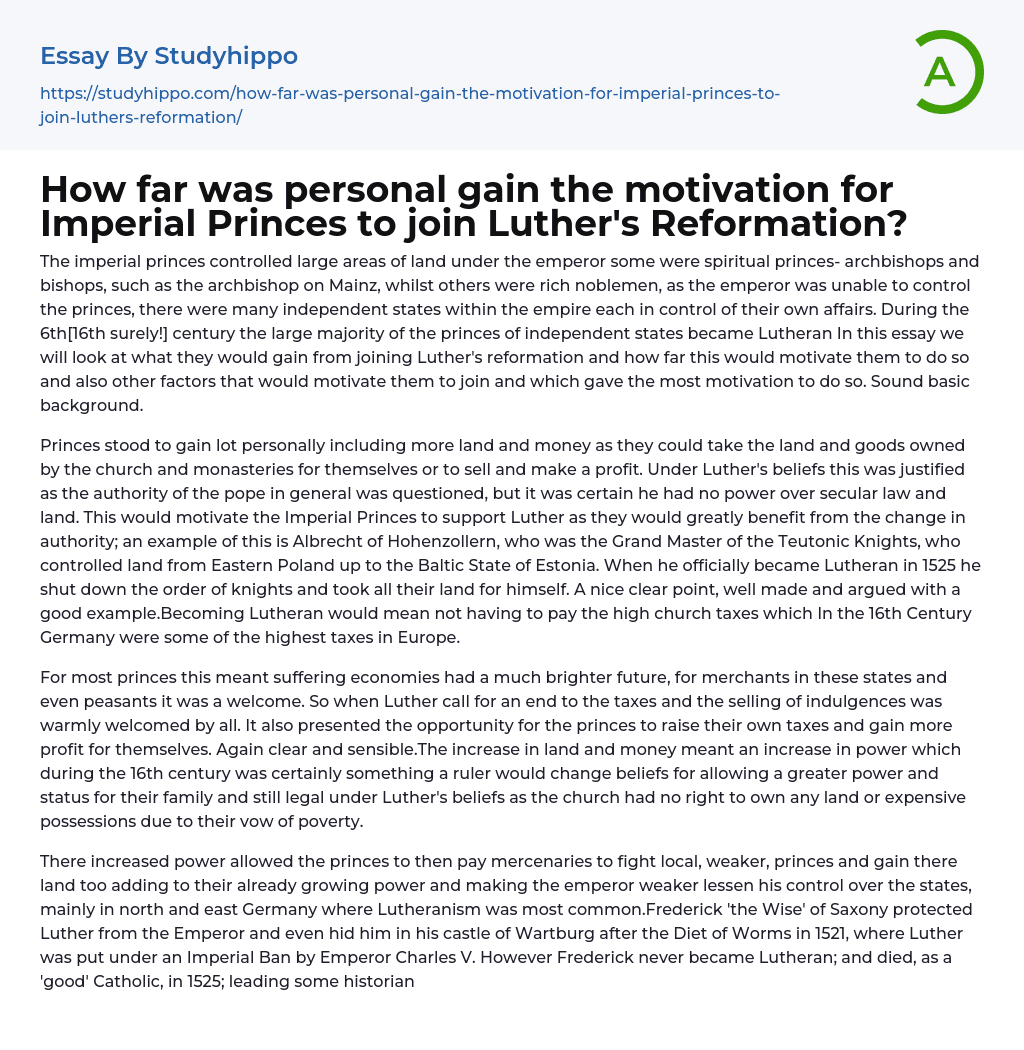The emperor's control was limited as the imperial princes, who included spiritual leaders like the archbishop of Mainz, as well as wealthy nobles, held significant land areas. Consequently, several independent states existed within the empire. In the 16th Century, most of these princes embraced Lutheran beliefs. This essay explores the advantages that drew them to Luther's reformation, evaluating the extent to which they were motivated to join and identifying other factors that influenced their decision.
Imperial Princes stood to gain significantly by embracing Luther's beliefs, as they could claim the land and goods of the church and monasteries for personal gain or sale. Luther's questioning of the pope's authority justified this action, though he did not have power over secular law and land. This motivated Imperial Princes like Albrecht of Hohenzoller
...n, Grand Master of the Teutonic Knights, who became Lutheran in 1525 and seized all their land for himself. By becoming Lutheran, Princes could avoid paying significant church taxes, which were among the highest in Europe in 16th Century Germany.
The brighter financial future brought about by Luther's call for the end of taxes and the selling of indulgences was welcomed not only by princes, but also by merchants and even peasants. The call presented an opportunity for the princes to increase their profits through higher taxes. Thus, the increase in wealth and land also meant an increase in power, which in the 16th century was a desirable outcome that many rulers were willing to change their beliefs for. This allowed for greater power and status for their family, while still remaining legal under Luther's beliefs, as the church was not permitted to own land o
expensive possessions due to their vow of poverty.
As the princes gained more power, they employed mercenaries to conquer weaker local princes and increase their own territories. This led to a decline in the emperor's control, especially in areas of Germany where Lutheranism was prevalent. Despite being a devout Catholic, Frederick 'the Wise' of Saxony protected Luther and sheltered him in his castle of Wartburg after he was banned by Emperor Charles V. Some historians speculate that Frederick used Luther as a political tool to maintain his influence and authority over the Holy Roman Emperor, although others argue that personal gain was not the main motivation for Imperial Princes to convert to Lutheranism.
Across Germany, many people were converting to Luther's ideas due to their genuine belief in his ideas. They saw more faults within the Catholic Church in Germany, such as the abuses and the selling of indulgences throughout the country. This practice even led to the building of a new St. Peter's Church in Rome. While the Church argued that indulgences were acceptable, Lutherans believed they were an abuse. As a result, many Germans viewed them as an abuse, and Luther's opposition to the practice ultimately won him more converts.
Imperial Princes probably received an education and were able to read Martin Luther's writings, such as "To the Nobility of the German Nation" and "On the Freedom of the Christian Man". Luther's works, combined with reading the Bible, helped the nobles comprehend his beliefs, leading them to support his reformation without seeking personal gain. If a prince's subjects wanted change in the Catholic Church, it was difficult to ignore their wishes. A ruler risked losing their
lands or facing a revolution if they dismissed their people's requests. In Wittenberg in 1521-22, when their ruler refused, the people decided to reform the Church themselves by removing Church images and using vernacular Bibles according to Luther's suggestions.
The regions to the North and East of Germany were the farthest from the control of Charles V, whose family possessed land in Austria and the Netherlands. It was in these regions that there was greater support for Martin Luther and his Reformation of the Catholic Church. It can be posited that the leaders in these areas were more likely to support Luther's beliefs due to the pressures they encountered from their surroundings. They did not want to create conflicts and tension between neighboring Lutheran states. Through rejecting the emperor's staunch Catholicism, which was what most imperial states desired, they sought increased autonomy. Ultimately, it is my view that while certain Imperial Princes may have backed Luther for their individual motives, including a genuine belief in his ideas.
It is possible that many supporters of Martin Luther and his Reformation of the Catholic Church in Europe may have sought personal gain from their actions. However, it is unclear if this was the only reason or a top priority for reforming rulers. The conclusion is not conclusive due to lack of depth, but the work is overall commendable.
Your extensive understanding and clear comprehension of the time period is demonstrated through the detailed elaboration and clarification you provide for numerous pertinent points. Overall, an exceptional performance.
- Baptism essays
- Holy Spirit essays
- Jesus Christ essays
- Adam And Eve essays
- Crucifixion Of Jesus essays
- Crusades essays
- Eucharist essays
- God The Father essays
- Pope essays
- Protestantism essays
- Christian essays
- Church essays
- Elizabeth essays
- Sacrament essays
- Catholic Church essays
- Lord essays
- Priest essays
- Protestant Reformation essays
- Afterlife essays
- Atheism essays
- Bible essays
- Buddhism essays
- Christian Worldview essays
- Christianity essays
- Confession essays
- Cosmological Argument essays
- Deism essays
- Devil essays
- Existence of God essays
- Faith essays
- Freedom Of Religion essays
- God essays
- Hinduism essays
- Immortality essays
- Islam essays
- Jainism essays
- Jews essays
- Judaism essays
- Miracle essays
- Monk essays
- Monotheism essays
- New Testament essays
- Old Testament essays
- Pilgrimage essays
- Puritans essays
- Revelation essays
- Ritual essays
- Salvation essays
- Sin essays
- Sinners essays




